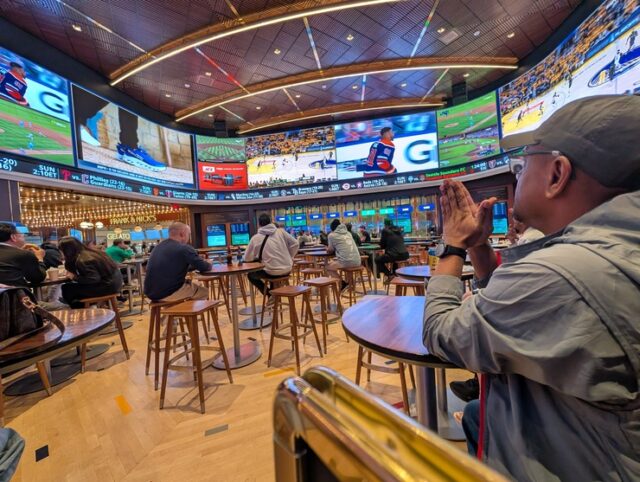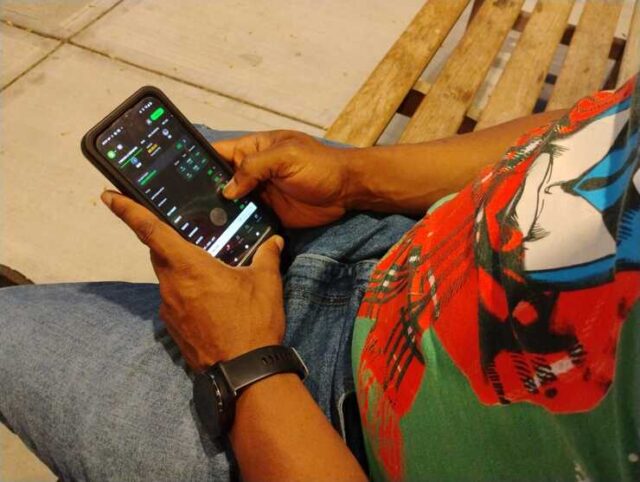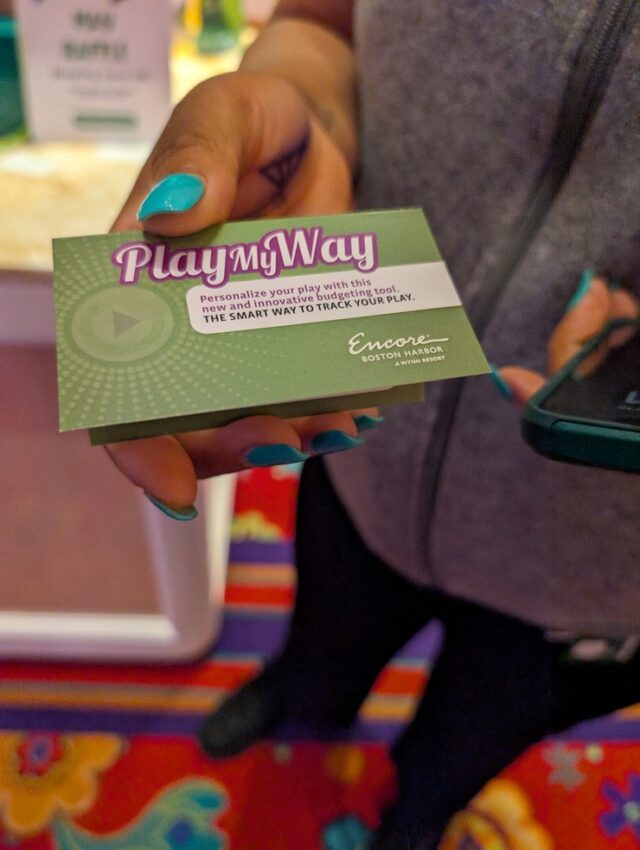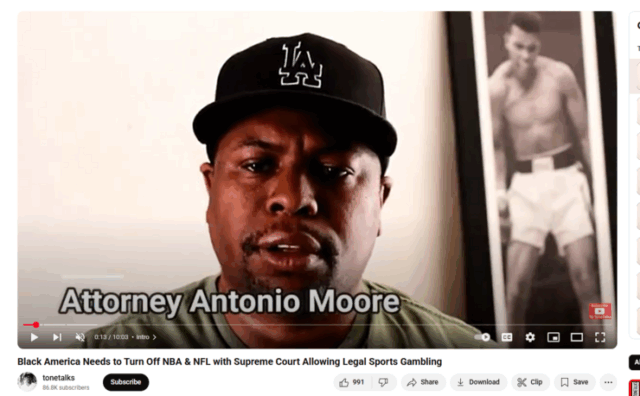Sports betting has come out of the shadows. Seven years ago, online gambling was illegal in the US. Now it’s a multi-billion-dollar business controlled by publicly traded companies. If you wanted to bet back then, you had to do it at a casino, a shady offshore website, or through a bookie. Now, it’s a multi-billion dollar industry controlled by states and a handful of publicly traded companies. Most states have made it possible for anyone to bet from a smartphone. And one in five Americans do. The problem is, the laws and resources available to deal with addiction are still structurally unequal, and they tilt in favor of corporations exploiting inequality for profit.
“Sports wagering…is kind of the middle-class white guy problem. That is consistently who’s playing, who’s checking themselves in the treatment, and who’s calling hotlines,” says Marlene Warner, Executive Director of the Massachusetts Council on Gaming and Health (MACGH). Marlene has been running a hotline and treatment program for 20 years. Massachusetts allocates the most of any other state to problem gambling resources. People come to get connected to counseling or support services to help them with a gambling problem.
According to the New York Council on Problem Gambling’s National Survey on Gambling Attitudes, 32% of Black Americans participate in sports betting. And Black Americans have rates of problem gambling twice that of whites. There are cultural differences in how Black Americans gamble that make it more difficult to track. Still, the data on how race impacts a person’s risk of gambling addiction is incomplete.
For example, Massachusetts, where Marlene provides services, is the most well-funded state problem gambling program in the nation. Most Southern states rank in the bottom half of all states for funding levels. Eight states do not fund problem gambling services at all.
“We are not seeing African-Americans show up in any great number,” says Marlene. “We don’t know how to find them and what they are gambling on. [We don’t know] how to get them at the point of interacting with the gambling product.”
Despite the fact that calls to the Massachusetts hotline have more than doubled every year for the last three years, she says Black people aren’t reaching out. There’s a bitter irony in the disparity. “We have the most profitable Lottery in the world per capita here,” says Marlene.

Photo by Author.
Daily Fantasy Sports – A Legal Trojan Horse
It took a few decades of political and legal maneuvers for PASPA’s repeal. First, they exploited a legal loophole that opened up a lane for “games of skill.”
Before companies like DraftKings and FanDuel entered the market, individual fans organized fantasy sports leagues. These betting pools consisted of groups of friends picking imaginary teams and playing them against each other in season-long contests. Fantasy sports was treated as an informal private activity and, for the most part, that’s what it was. No one got rich, but no one went broke either.
Then technology companies developed online platforms for fantasy leagues. The introduction of technology helped fantasy leagues grow larger, offer larger cash prizes and, in a few cases, command mainstream sponsorships and publicity.
Greater visibility and mild endorsement from the leagues brought more people to fantasy sports. It also brought more public scrutiny about whether the private pastime had evolved into full-blown illicit gambling. Nevertheless, fantasy sports remained pretty niche and, because of the long time horizon for winnings, hard to commodify.
That was the context in which Congress gave fantasy sports an exemption when it passed the Unlawful Internet Gambling Enforcement Act of 2006 (UIGEA). The bill, which banned gambling sites from accepting online transactions, decimated the online poker and casino games industry overnight. However, it exempted fantasy sports, which several members of Congress and sports leagues advocated for. The bill’s “game of skill” exemption language stuck. At the time it was passed, it was presumed to apply only to fan-driven fantasy pools. Though it wasn’t written in anticipation of corporatized fantasy sports, the exemption would be the key to ushering it in.
Although UIGEA didn’t make gambling legal, allowing fantasy sports to continue to accept online payments when online casinos and poker rooms would face liability, opened a legal loophole for fantasy sports. The next generation of gambling tech companies would be dedicated to exploiting UIGEA’s legal safe haven fantasy sports.
FanDuel and DraftKings launched in 2009 and 2012 respectively, releasing “daily fantasy sports” platforms which, despite having the word “fantasy” in the name, bore minimal resemblance to the traditional fantasy sports model. Rather than season-long contests, the platform staged daily matchups. Both companies also offered platform-organized play and, eventually, parlay bets. The format, which was invented by a poker player, had that unmistakable imprint of casino play–faster play and more action. The companies claimed to be responding to demand from sports fanatics.
In reality, they were attempting to expand their companies by pushing the limits of the law and evading federal regulators. The measured roll-out of features was as much a legal strategy as it was a stroke of innovation.
Move Fast and Break Stuff: Gambling Tech’s Legal Strategy

Photo by Author.
“There is no business. If you can’t get away with breaking the law, ,” says Dr. Hillary Allen.
Dr. Allen, a law professor at American University’s Washington College of Law, specializes in financial regulation with a focus on new financial technologies, including blockchain and cryptocurrency. She says all financial technology companies devote massive resources to avoiding regulation or outright defying it.
“I find it very darkly humorous, all this stuff about innovation coming out of Silicon Valley. Whatever…it’s just the lawyers. Not all, but so much of it is the lawyers and the lobbyists getting the law changed, finding loopholes…it’s not the guys in the gray hoodies. It’s the lawyers,” says Dr. Allen, letting out a chuckle.
Here, daily fantasy sports companies introduced features that made their product function more like outlawed gambling products, then deployed legions of lawyers and public relations managers to sow doubt about the true nature of their product. Though Illinois, New York, and Nevada eventually cracked down, it was already too late to stop them from gaining momentum.
“There is no business. If you can’t get away with breaking the law”
DraftKings and FanDuel lobbied state governments to pass industry-drafted legalization bills. Gambling lobbyists pushed a very specific narrative designed to ingrain pro-gambling, deregulatory ideas into the minds of state lawmakers.
Their pitch was two-fold. First, legalized sports betting was the only safeguard against shady illegal offshore sportsbooks. Second, they promised that sports betting would provide states with a windfall of tax revenue to shore up their budgets and jobs. The specter of the illegal gambling trade (and bribes, er…donations) was persuasive. In the name of allowing legal sports betting to “compete” with the illegal trade, they passed bills with minimal business regulations and very low average tax rates.
The Consequences of Legalization
Sports betting is now legal in some form in 39 states and the District of Columbia. Users placed over $147 billion in wagers last year, with the sports betting industry claiming over $13 billion of that as profit. Sportsbooks doubled down on highly sophisticated targeted advertising. Ads on social media are pervasive–to the point of turning some viewers off–even in states where betting is illegal. Moore sees the advertising as the most insidiously predatory part of the whole thing.
“You have shows from Shannon Sharpe, Gilbert Arenas, Joe Budden…all promoting gambling as a pseudo type of commercial. These gambling houses are using Black nostalgia stories as a sort of commercial to sell sports gambling with popular culture.”
DraftKings and FanDuel sponsor celebrity podcasts featuring hip hop artists, athletes, and influencers. It has gotten so that no one of any age can avoid gambling ads.
Companies are also getting better at getting gamblers to wager every last dime they have. Sports betting apps are designed to keep bettors on the app. They make signing up as frictionless as possible, continuously push betting options, and make safety controls as difficult to access as possible. Supercharging the addictive features has produced devastating results.
As sports betting profits climb, signs of societal and economic harm are rising with it. In states with legalized sports gambling, average credit scores and savings rates have fallen, and bankruptcy and debt collection rates are on the rise. Call volumes to problem gambling helplines across the country have increased several-fold, with more calls coming in from younger individuals. Intimate partner violence goes up when users lose big on sports betting platforms.
It is against that backdrop that states are starting to question whether legalization was the right thing to do. While Vermont is considering full repeal, more states are trying to increase the taxes collected from the sportsbooks. New York and New Hampshire charge 51%, but most collect much less.
States that have legalized sports betting brought in more than $1.8billion in tax revenue, by taxing sportsbooks and have come to rely on this revenue to stabilize state budgets. Of that money, they collectively allocate a little over $130 million to problem gambling resources.
Mark Gottlieb, Executive Director of Northeastern Law’s Public Health Advocacy Institute (PHAI), calls gambling profits public losses or “money that belonged to the public that now belongs to the industry operators and their profit partners, which include State governments…the professional and some and amateur sports leagues [and] the media.”
Mark and PHAI founder, Richard Daynard, have been fighting the Tobacco industry since the late 1970s. They’ve won billions to help states pay for the harms caused by smoking. Daynard and Gottlieb immediately recognized sports betting as an extractive industry where companies push an addictive product for massive profit.
As Gottlieb points out, the problem with the state regulatory system is baked into the relationship between states and the companies they regulate. Every dollar of gambling profit represents gambling losses for the customer. Perhaps it goes without saying but, for states to collect more taxes, sportsbooks have to have a profitable year, which means more and more people have to lose money. The vast majority of users lose most of the money they wager. If sports betting drives problem gambling, the gambler is subsidizing the cost of the care for a condition they may not have acquired without such easy access to sports gambling.
“Obviously, it would be more efficient if the feds were to pass a strong law. Like the SAFE Bet Act,” says Daynard.
Introduced by Congressman Paul Tonko (NY-20) in 2024, the Safe Bet Act would hold sportsbooks to minimum federal standards on advertising, financial practices, and the use of AI. If passed, it would prohibit daytime advertising, limit the use of AI to track user behavior or push custom offers, and require operators to take steps to make sure users were not wagering money they can’t afford to lose. Some of the proposed regulations mirror the restrictions placed on the Tobacco and alcohol industries.
Daynard and Gottlieb say it’s the first piece of legislation to take a public health approach to gambling regulation. By limiting or prohibiting the business practices that Daynard and Gottlieb believe drive addiction, they are preventing harm rather than treating it after the fact. A public-health strategy recognizes that the product can be addictive and enacts reasonable measures to protect consumers. That’s a stark departure from the industry-created “responsible gaming” framework.
“People fall off the cliff,” says Daynard. “The ‘responsible gaming’ approach is, we are here with the ambulance. The public-health approach is, you put a fence up on the top,” says Daynard.
“The approach to problem gambling that the industry promotes–responsible gambling– focuses on what’s wrong with this very low percentage of customers that experience problems with these products,” says Gottlieb
Responsible Gaming (RG) is, first and foremost, a public relations strategy employed by the gambling industry to draw as little attention as possible to the addiction. And as much attention to their brands through social responsibility initiatives.
”They call it ‘gaming’, not gambling. It’s just fun and games. They have a little euphemism in there. So, anybody who has a negative reaction to gambling. ‘No, no, it’s just gaming,’” Daynard.

Photo by Author.
In RG speak, gambling is just entertainment, and users are encouraged to “play responsibly.” The message is that it is up to the individual user to self-regulate, never mind the sticky features of many of these apps. Richard and Mark say they’re blaming the victim.
RG initiatives offer a set of supports that place the responsibility on the individual to distance themselves from gambling. Voluntary self-exclusion, counseling and gamblers anonymous groups are the pillars of the RG treatment approach.
RG also operates as the gambling industry’s defense against state regulators. The industry has taken pains to ensure RG is the primary framework used by governments that have the power to regulate their business. State problem gambling programs publicize their commitment to RG best practices, even though there is empirical research showing it has a negative effect on individuals seeking treatment. Sportsbooks fund addiction research. They sit on problem gambling boards. Institutions have raised red flags about the conflicts of interest there.
Gottlieb and Daynard believe the SAFE Bet Act would change that dynamic. By bringing in federal regulators, it provides minimum guidelines for states and ensures uniformity across the country.
Regarding the SAFE Bet Act, Dr. Allen had this to say.
“I suspect there are a lot of people who are trying to do the right thing, but I think it comes back to my broader concern. Financial regulation often proceeds from the place that the tech industry or the finance industry tells us that their product will do X. We take them at their word, and then try to mitigate the harms whilst trying to capture the benefits that they have promised.”
Whether it is crypto, or gig work, or sports betting, we start from a belief that the companies that produce these products are trying to solve a real problem. Our need for coherent supply and demand narratives makes it easier to create policies that assume they are true. The presumption blunts our ability to seriously evaluate the true risk posed by new financial technologies.
“What I’ve found over and over with products in the Fintech space is that the benefits are often unjustified and illusory,” she says.
This is where the comparison to Daynard’s fight against the Tobacco Industry becomes salient. The industry deployed countless tactics to confuse and mislead people about the intrinsic value of their products in order to stay in business. Though it took a few decades, we eventually realized that the costs were too high. We have known for decades that proximity to gambling products drives addiction. Perhaps we should treat all peddlers of addictive or dangerous products as if they should be regulated into oblivion.
Maybe Sports Betting Isn’t Entertainment
We can, and must, regulate harmful products more boldly. We don’t have to accept ever-present misery for the sake of innovation. The key to better financial regulations is more suspicion of their basic value proposition.
“What I’ve found over and over with products in the Fintech space is that the benefits are often unjustified and illusory,” she says.
Which is why I shared my doubts with Richard about whether the SAFE Bet Act would be effective enough to keep people from being irreparably harmed by sports betting. Richard said he was concerned about keeping people from ruining their lives. That sports betting is making people gambling away money they could use to buy their first house or pay for education. When I asked him how he would assess the bill knowing that for many people in today’s economy, a home purchase and college were out of the question? What about the people who are either gambling out of a lack of hope or out of a distorted form of ambition?
“There’s nothing you’ve said until now that I strongly disagree with, but I strongly disagree with this…The fact that people have other troubles is hardly an excuse to put on another one … .Okay, maybe you can’t do it in your 20s. Maybe you have to wait till your 30s or something like that? But maybe something will turn up economically. And to the extent that people think of it as entertainment, it’s fine, and to the extent. People just do a little bit of it as entertainment. That’s fine. You know, most people you know can afford five or ten bucks every now or then. It’s not going to make a difference in achieving their life goals. But. That’s not what’s happening? I mean to the extent that’s happening, that’s not what we’re concerned with. We’re concerned with the very large number of people whose lives are being ruined. Whether they would have done fabulously or okay someday or not okay. Everyday, not okay, or near suicidal or stealing money from their family…?”
I let him finish. We’re talking to each other across a canyon. My beef isn’t with Richard or any of the provisions in the SAFE Bet Act. The control features it proposes are admirable, and they are fundamentally about protecting households with wealth and significant assets. Below that threshold, vulnerable users are subjected to the same “responsible gambling” framework that Daynard critiques.
Perhaps this is what made Antonio Moore call for Black households to abstain from sports and sports betting altogether.
Regulate Around the Edges or Ban Sports Betting?
“My caution would be–not knowing a ton about these particular individual debates–is, don’t tailor the legislation so closely to the state of the apps right now, because the tech will evolve. It will provide opportunities for loopholes. Whenever you get too specific, you have unintended consequences,” says Allen.
Yes, like the UIGEA–which was intended to chill online gambling technologies but ended up being used as a vehicle to bring online gambling back from the ashes–the tech will evolve because the legislators write laws presuming the tech will remain relatively static. The laws leave openings, and the cycle of workarounds starts again.
I asked her how she might write a bill in that vein.
“Bigger, blunter rules that are agnostic about the technology used. That’s typically more effective in preserving the public interest. Now, whether there’s the political will…is a whole other question,” says Allen.
So, a ban? I asked.
“What I like to say is that what the law gives, the law can take away. There’s no divine right to be able to provide people with gambling services.”












